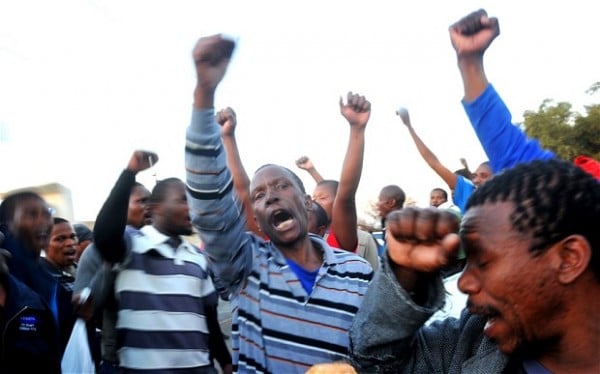
News over the weekend that platinum-producing giant Anglo American Platinum (Amplat) had fired 12,000 workers from its mining operations in Rustenberg, South Africa, just north of Johannesburg, added fueling to an already highly combustible situation. The workers are striking in hopes of obtaining higher wages and improved working conditions from the world’s largest platinum producer. This comes shortly after violence at the mine occurred Thursday, in which police used rubber bullets and tear gas to disperse protesters, killing one worker, identified as Mtshunquleni Qakamb. Now representatives for the workers say they will file murder charges against the police.
All of this looms after a dark shadow was cast when 34 people were killed at the Lonmin-owned Marikana platinum mine, when police clashed with protesters who were also on strike with similar demands. A deal has since been struck that raised wages up to 22 percent and included bonuses for some workers. However, due to the low wages already present at the mining operation, this deal falls well short as a satisfactory agreement.
While many believe that the firing was an empty threat, due to the company’s inability to train 12,000 new workers, it appears to be just the latest move in a battle of low wages in an industry that is already reeling from the rapid decline in platinum prices, due to major surpluses on the global market. Surpluses which can be attested to overproduction by the same companies that claim their hands are tied due to smaller profits, despite the fact that platinum outperformed all other commodities with a 27 percent increase in revenue 2011.
Rock drillers at the mining operations in Rustenberg currently make an average of 4000 Rand or $490 per month, which fails to cover the basic cost of living in the area, forcing many workers to live in squalid conditions in mining area shanty towns. Their demands are not simply about pay, but horrid work conditions, as many of them claim to operate in a dangerous environment for 14 hours+ per day, underground, without receiving any overtime pay.
The world’s largest platinum producers including both Lonmin and Amplat have claimed that sharply declining prices in platinum commodities have led to major losses across the board that have been compounded due to the inability to run most of its mining operations because they are so understaffed. But are these cuts just bottom-line thinking to preserve the profits for the upper echelon of the company at the expense of the average worker?
Platinum is not the only industry that is reeling from large strikes, AngloGold Ashanti, South Africa’s largest bullion producer, has also halted much of its operations due to massive strikes. However, gold miners have much more stable bargaining patterns and better living conditions than platinum workers. This has led to the rise of the more radical American Mine Workers and Construction Union within the platinum sector as workers move away from the government-friendly National Union of Mineworkers.
While it is clear that laborers are underpaid and often working in dangerous conditions for long hours, the bigger issue is the lack of protection for workers by the South African government, whose main driver in the economy, mining, is often controlled by large foreign companies that headquarter outside of the country and have little care for the rights of the average worker, as long as the pockets of executives continue to be lined. Couple this with the fact that these companies have been utilizing state-run police forces to use violence against to curb strikes and protests, and it calls into question what the real interests of the government are.
President Jacob Zuma and his union allies have done little to support the striking workers and take a stand against foreign companies that exploit the average miner. Now, other leaders within the African National Congress (ANC) have called for the president to step down in light of the government’s participation in, and inaction after, the massacres of August 16th in Marikana. Calling for a week of national mourning is simply not enough.
If anything positive can be drawn from these tragic events it is that the horrible conditions and meager pay provided to workers at these mines has been brought to light. Exploitation of African resources by outside companies and nations has been rampant since colonial times. People think that since the collapse of apartheid and the fact that it possesses the largest economy in Africa somehow keep South Africa away from such problems, but this is certainly not the case. It is time for the South African government to step up and defend its people and its resources from companies that look to exploit it, especially with little regard for their workers.
Is firing 12,000 people that have a legitimate gripe against the company really something that the government will permit, especially for a country that already poses a near 25 percent unemployment rate? Whether the ANC steps in to discuss the possibilities of nationalizing the industry, rewrite labor laws to provide more protection to workers, or impose harsh penalties against those companies that look to exploit their workers, something must be done to right these wrongs. The first step would be to regulate the use of force by police officers against protesters.
If South Africa is going to become the leader of the sub-Saharan portion of the continent, it must clean up its own backyard and provide a safe, productive and lucrative environment for its miners.